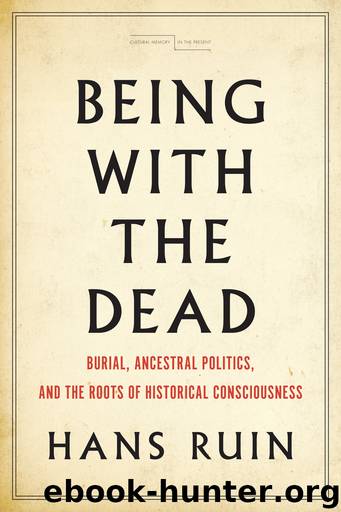Being with the Dead by Ruin Hans

Author:Ruin, Hans [Ruin, Hans]
Language: eng
Format: epub
Publisher: Stanford University Press
Published: 2018-03-21T16:00:00+00:00
6
Visiting the Land of the Dead
HISTORY AS NECROMANCY
The mirror of history has melted, and beneath it, a patient, hybrid organism grows in his cruciform shadow.
—Derek Walcott, Omeros LIX
Introduction
When Odysseus, after his long captivity on the island of Calypso, is washed ashore in the land of the Phaeacians, he is treated with a feast by King Alcinous. Initially the king does not know who his guest is, because Odysseus has refused to say his name. At the height of the feast Alcinous asks the blind bard Demodocus to sing the stories from the great Trojan War as though they had already become folk mythology and oral epic during Odysseus’s long years of delayed homecoming. In the presence of one of the protagonists who actually experienced it, the story of the dramatic events is thus recounted within the framework of the epic itself. In this remarkable early instance of metaliterature, the author of the epic poem inscribes the oral performer of the epic into the text, situating the social and technical origin of his own endeavor as a writer within the narrative. When Odysseus hears the stories of his own adventures and is reminded of his lost companions, he is deeply moved. He tries to conceal his tears, but Alcinous sees them and compels him to reveal his identity and to explain why he is so saddened by the narrative. It is at this point that Odysseus first says his name and that he begins to tell his story, not only of who he is and where he comes from but also what he has experienced. Throughout the night of the feast he takes over the story from the bard and tells the story of his adventures after Troy, leading up to the shipwreck and his encounter with Calypso.1
In her essay “The Concept of History” from the collection Between Past and Future, Hannah Arendt pointed to the particular scene where Odysseus listens to Demodocus as marking the “beginning of history.”2 As the living hero is confronted with his own deeds through a collectively shared narrative, he and his life have become objectified “history” in precisely the sense that Herodotus would later give to this term. For Herodotus, as Arendt points out, the basic and explicit motive was to secure that the “great deeds” of both Greeks and barbarians were not forgotten, but preserved in memory, and that their glory and reputation—their kleos—would not perish. Humans are mortal, surrounded by immortal gods and nature, but through works of greatness preserved in oral and eventually written narrative, they can aspire to take place in, as Arendt writes, “the world of everlastingness.”3
Arendt’s suggestion was taken up by François Hartog in a more recent article on the origin of the concept of history, where he explicitly discusses the relation between Homer and Herodotus.4 Hartog argues that whereas Herodotus first simply sought to rival Homer and the Trojan epic through his depiction of the Persian Wars, it turned out that he had created a new and unique form of narrative and literary voice, history.
Download
This site does not store any files on its server. We only index and link to content provided by other sites. Please contact the content providers to delete copyright contents if any and email us, we'll remove relevant links or contents immediately.
| Archaeology | Essays |
| Historical Geography | Historical Maps |
| Historiography | Reference |
| Study & Teaching |
Underground: A Human History of the Worlds Beneath Our Feet by Will Hunt(12095)
Sapiens by Yuval Noah Harari(5368)
Navigation and Map Reading by K Andrew(5152)
The Sympathizer by Viet Thanh Nguyen(4387)
Barron's AP Biology by Goldberg M.S. Deborah T(4150)
5 Steps to a 5 AP U.S. History, 2010-2011 Edition (5 Steps to a 5 on the Advanced Placement Examinations Series) by Armstrong Stephen(3731)
Three Women by Lisa Taddeo(3430)
Water by Ian Miller(3181)
The Comedians: Drunks, Thieves, Scoundrels, and the History of American Comedy by Nesteroff Kliph(3077)
Drugs Unlimited by Mike Power(2594)
A Short History of Drunkenness by Forsyth Mark(2294)
DarkMarket by Misha Glenny(2212)
And the Band Played On by Randy Shilts(2203)
The House of Government by Slezkine Yuri(2203)
The Library Book by Susan Orlean(2065)
Revived (Cat Patrick) by Cat Patrick(1991)
The Woman Who Smashed Codes by Jason Fagone(1970)
The Absolutely True Diary of a Part-Time Indian by Sherman Alexie(1911)
Birth by Tina Cassidy(1903)
